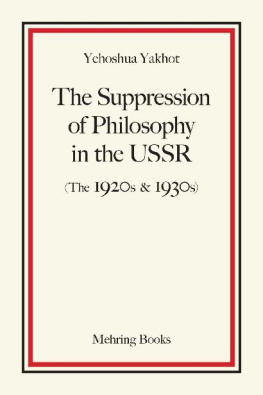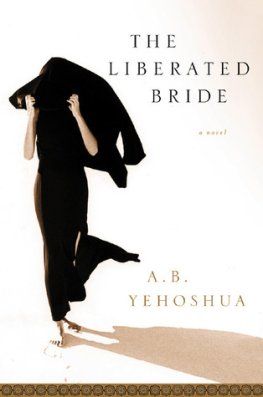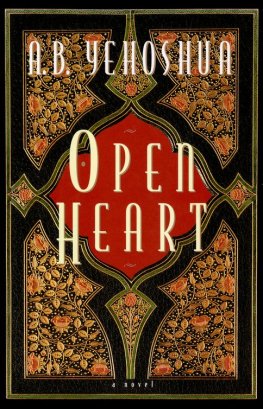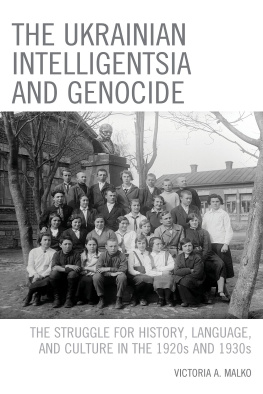Yehoshua Yakhot - The Suppression of Philosophy in the USSR (The 1920s & 1930s)
Here you can read online Yehoshua Yakhot - The Suppression of Philosophy in the USSR (The 1920s & 1930s) full text of the book (entire story) in english for free. Download pdf and epub, get meaning, cover and reviews about this ebook. year: 2013, publisher: Mehring Books, genre: Religion. Description of the work, (preface) as well as reviews are available. Best literature library LitArk.com created for fans of good reading and offers a wide selection of genres:
Romance novel
Science fiction
Adventure
Detective
Science
History
Home and family
Prose
Art
Politics
Computer
Non-fiction
Religion
Business
Children
Humor
Choose a favorite category and find really read worthwhile books. Enjoy immersion in the world of imagination, feel the emotions of the characters or learn something new for yourself, make an fascinating discovery.
- Book:The Suppression of Philosophy in the USSR (The 1920s & 1930s)
- Author:
- Publisher:Mehring Books
- Genre:
- Year:2013
- Rating:4 / 5
- Favourites:Add to favourites
- Your mark:
- 80
- 1
- 2
- 3
- 4
- 5
The Suppression of Philosophy in the USSR (The 1920s & 1930s): summary, description and annotation
We offer to read an annotation, description, summary or preface (depends on what the author of the book "The Suppression of Philosophy in the USSR (The 1920s & 1930s)" wrote himself). If you haven't found the necessary information about the book — write in the comments, we will try to find it.
The Suppression of Philosophy in the USSR (The 1920s & 1930s) — read online for free the complete book (whole text) full work
Below is the text of the book, divided by pages. System saving the place of the last page read, allows you to conveniently read the book "The Suppression of Philosophy in the USSR (The 1920s & 1930s)" online for free, without having to search again every time where you left off. Put a bookmark, and you can go to the page where you finished reading at any time.
Font size:
Interval:
Bookmark:
Yehoshua Yakhot
The Suppression of Philosophy in the USSR
(The 1920s & 1930s)
Translated by Frederick S. Choate

2012 Mehring Books
All rights reserved.
Published by Mehring Books
P. O. Box 48377
Oak Park, MI 48237
Printed in the United States of America
Translation of Podavlenie filosofii v SSSR (2030 gody) , New York, 1981
Library of Congress Cataloging-in-Publication Data
IAkhot, I.
[Podavlenie filosofii v SSSR (20-30 gody). English] The suppression of philosophy in the USSR (The 1920s & 1930s) / Yehoshua Yakhot; translator, Frederick Choate.
p. cm.
Includes bibliographical references and index.
ISBN-13: 978-1-893638-30-3 (pbk. : alk. paper)
ISBN-10: 1-893638-30-8 (pbk. : alk. paper)
ISBN-13: 978-1-893638-33-4 (ebook)
ISBN-10: 1-893638-33-2 (ebook)
ISBN (mobi edition): 978-1-893638-33-4
1. Philosophy, Russian--20th century. 2. Soviet Union--History--20th century. 3. Soviet UnionPolitics and government--20th century. 4. CommunismSoviet Union. 5. Socialism--Soviet Union. I. Title.
B4231.I1713 2012
197dc23
2012017105
Contents
About the Author
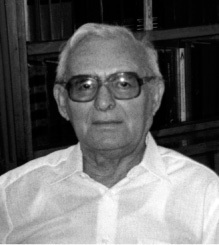
Yehoshua Yakhot [o ( )] was born on 2 March 1919 in Yaryshev, in the Vinnitskaya area, now in Ukraine. He volunteered to go to the front with a group of students from the Moscow Institute of Philosophy, Literature, and History [IFLI] on 22 June 1941, the day that Hitlers armies invaded the Soviet Union. Poorly trained and equipped, lacking even shovels, they were sent directly into battle. In March 1942, Yakhot was wounded and was one of the very few who survived when attacked by the German Luftwaffe near the town of Ostashkov, not far from Moscow.
Yakhot completed undergraduate study in philosophy at Moscow State University in 1943, became a member of the CPSU in 1946, and finished graduate study at the Moscow State Pedagogical Institute in 1947. From 1947, he taught at the Moscow Finance Institute. He became a Doctor of Philosophical Sciences in 1965 and a Professor in 1966. His areas of scholarly research were problems of dialectical materialism and philosophical problems of social statistics.
Yakhot enthusiastically embraced the partial de-Stalinization that began with Nikita Khrushchevs speech to the Twentieth Congress of the CPSU in February 1956. During the thaw, he parted ways with some of his pro-Stalin friends who could not accept the change in party line. Yakhot not only rejected Stalin politically, but saw him as a poor philosopher.
Yakhot was a devoted Marxist who thought that Marxist philosophy was a great achievement of the human mind on the level with Kants and Hegels. He never renounced these convictions to the end of his days.
In 1975, Professor Yakhot emigrated to Israel and the following year became a professor at Hebrew University in Jerusalem. Life in emigration was not easy; as a convinced atheist (i.e., as a materialist), he could not accept the religious pressures that were part of Israeli society. Linguistic barriers contributed to a certain isolation, but he found a small number of close collaborators at the university (whom he thanks in his foreword to this book). Yehoshua Yakhot died on 21 December 2003 in Tel Aviv.
The present book on philosophy in the USSR was first published in Russian by Chalidze Publications in New York in 1981. It was then serialized in the journal Voprosy filosofii [Problems of Philosophy] in Moscow in the fall of 1991.
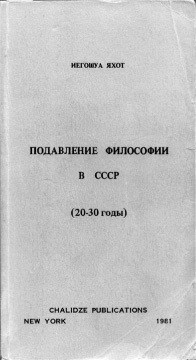
First edition of The Suppression of Philosophy in the USSR , printed in Russian by Chalidze Publications in New York, 1981
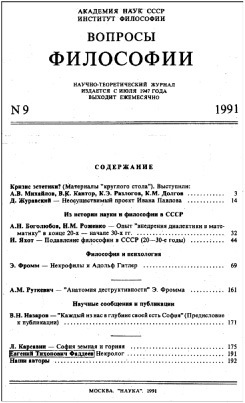
First Soviet edition of The Suppression of Philosophy in the USSR , published serially in the journal Problems of Philosophy , 9-11, 1991
A partial list of Yakhots other publications
.. , [Laws of Nature and Society], . : , 1960, 68 .
.. , [What Is Truth?], 2- .., . : , 1960, 78 .
[Matter and Consciousness], ., 1961.
[Negation and Continuity in Historical Development], , 1961, 3, pp. 146-156.
.. , - [Popular Conversations About Dialectical Materialism], .: o, 1962, 263 .
. . , , o o - [Purposiveness, Omnipotent God, and Laws of Nature], .: , 1962, 79 .
. [Adolf Ketle (Lambert Adolph Jacques Quetelet) and Certain Problems of Determinism], , 1964, . 8.
[The Law of Large Numbers and Social Statistics], , 1965, 12.
O. Yakhot, What Is Dialectical Materialism (Popular Talks), translated by Clemens Dutt, Moscow: Progress Publishers, 1965.
Ovshy Yakhot, Philosophy of the New World , Moscow: Novosti Press Agency Publishing House, 1966.
o [Statistics and Sociological Research], ., 1966.
.. , [Outline of Marxist Philosophy], .: , 1968, 255 .
Ovshy Yakhot, Materialist View on Reality , Moscow: Novosti Press Agency Publishing House, 1968.
o [Statistical Regularity in Sociological Analysis], ., 1969.
(2030 o ) [The Suppression of Philosophy in the USSR (The 1920s & 1930s)], New York: Chalidze Publications, 1981; republished in the Soviet journal , 1991, 9, 10, 11.
The Theory of Relativity and Soviet Philosophy, Crossroads [Israel Research Institute of Contemporary Society], Autumn 1978, pp. 92-118.
The Marxian Notion of Ideology, Studies in Soviet Thought , vol. 20, 1 (July 1979), pp. 43-49.
The Leninist Stage in Soviet Philosophy, Studies in Soviet Thought , vol. 20, 3 (October 1979), pp. 303-308.
o (30- o) [The Fate of Statistics and Mathematical Methods in Sociology (1930s)], CCCP: , New York: Chalidze Publications, 1981, 1, pp. 158-200.
o o - [The Death of Bogdanovs Tektology Predecessor of Cybernetics and Systems Theory], , New York: Chalidze Publications, 1982, 3, pp. 227-273.
Jews in Soviet Philosophy, in: Jews in Soviet Culture , edited by Jack Miller, London: Transaction Books, 1984, pp. 215-246.
A Brief Foreword by the Author (1981)
The history of Soviet philosophy, particularly of the 1920s and 1930s, has not yet been made public in the Soviet Union. Until recently, this has generally been a forbidden topic, and the majority of documents are located to this day in the so-called spetskhrany, closed archives that are inaccessible to the general reader. Individual voices have been raised in recent years saying that it is time, at long last, to investigate this period, but they have accomplished nothing. Moscow has published four volumes of The History of Philosophy in the USSR . The fifth volume, which covers precisely the Soviet period, has yet to appear. And although certain efforts have been made to publish it, ten years have already passed since the publication of the fourth volume, and there still is no fifth. The authors have run into grave difficulties.
For a proper elucidation of the history of Soviet philosophy might discredit not only certain individuals, but official doctrine as a whole. In essence, the prestige of Marxist philosophy had already fallen sharply by the end of the 1940s, particularly in the eyes of natural scientists. They often associated the word philosopher with a petty functionary who knows nothing about science, but who, in the name of the purity of Marxism, intervenes in its affairs and actively conducts a battle against heresy. Stalin and his philosophical assistants turned philosophy into a truncheon that more than one scientist felt upon his back. Thus, the declaration that genetics was a pseudo-science was cloaked with philosophical terms and phrases. In the 1920s, the activity of the talented scientist and philosopher A. A. Bogdanov, which is now recognized as the beginning of the era of cybernetics, was denounced as anti-Marxist and eradicated, also out of purely philosophical considerations. Einsteins theory of relativity was declared by certain leaders of the philosophical front to be an idealist and Machist doctrine, which at the time was a most severe condemnation. In any history of Soviet philosophy, it is impossible to pass over such unheard of obscurantism in silence, but to give it a rational explanation (from the standpoint of official Soviet philosophers) is beyond human powers. Hence it is clear what insuperable obstacles stand in the way of an objective history of Soviet philosophy, if it is written in Moscow.
Next pageFont size:
Interval:
Bookmark:
Similar books «The Suppression of Philosophy in the USSR (The 1920s & 1930s)»
Look at similar books to The Suppression of Philosophy in the USSR (The 1920s & 1930s). We have selected literature similar in name and meaning in the hope of providing readers with more options to find new, interesting, not yet read works.
Discussion, reviews of the book The Suppression of Philosophy in the USSR (The 1920s & 1930s) and just readers' own opinions. Leave your comments, write what you think about the work, its meaning or the main characters. Specify what exactly you liked and what you didn't like, and why you think so.

